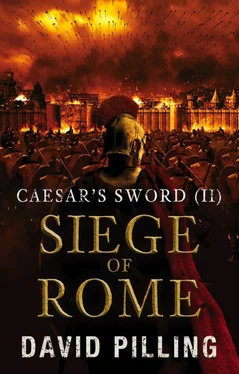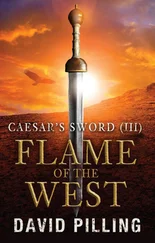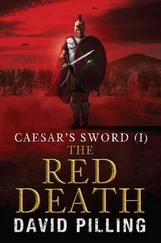David Pilling - Siege of Rome
Здесь есть возможность читать онлайн «David Pilling - Siege of Rome» весь текст электронной книги совершенно бесплатно (целиком полную версию без сокращений). В некоторых случаях можно слушать аудио, скачать через торрент в формате fb2 и присутствует краткое содержание. Год выпуска: 2013, Жанр: Исторические приключения, на английском языке. Описание произведения, (предисловие) а так же отзывы посетителей доступны на портале библиотеки ЛибКат.
- Название:Siege of Rome
- Автор:
- Жанр:
- Год:2013
- ISBN:нет данных
- Рейтинг книги:3 / 5. Голосов: 1
-
Избранное:Добавить в избранное
- Отзывы:
-
Ваша оценка:
- 60
- 1
- 2
- 3
- 4
- 5
Siege of Rome: краткое содержание, описание и аннотация
Предлагаем к чтению аннотацию, описание, краткое содержание или предисловие (зависит от того, что написал сам автор книги «Siege of Rome»). Если вы не нашли необходимую информацию о книге — напишите в комментариях, мы постараемся отыскать её.
Siege of Rome — читать онлайн бесплатно полную книгу (весь текст) целиком
Ниже представлен текст книги, разбитый по страницам. Система сохранения места последней прочитанной страницы, позволяет с удобством читать онлайн бесплатно книгу «Siege of Rome», без необходимости каждый раз заново искать на чём Вы остановились. Поставьте закладку, и сможете в любой момент перейти на страницу, на которой закончили чтение.
Интервал:
Закладка:
“Stretch!”
Christ save us! They were less than twenty feet away now, a surging tide of galloping horses and gleaming lances and fierce, pale faces, hundreds of pairs of eyes blazing with hatred under bright steel helms.
It was death to stand firm against that charging horror. It was death to turn and run. I stood, fixed to the spot like a worm on a nail, my right hand curled tightly about Caledfwlch’s hilt, as if my little sword would be of any use now.
“Loose!”
A rushing sound, like thousands of birds taking to the air at once, briefly drowned out the thunder of hoofs and the frantic hammering of my pulse.
The front rank of Gothic horsemen seemed to falter, their beasts twisting and rearing and screaming and plunging back onto their haunches. Their yelling riders were thrown, or shot from the saddle, and fell under the churning hoofs of the riders in the second line.
“Loose!”
A second flight of arrows, darkening the skies, and a third, and a fourth, pouring like hail into the Gothics, mowing down riders and horses and throwing their ranks into desperate confusion.
“At them!” screamed one of my Isaurians, “kill them all! Just kill them!”
He would have broken ranks and rushed forward, taking others with him, but I seized his shoulder and dragged him back into line.
“Stand your ground, fool!” I hissed into his ear, “or I’ll have your skin flayed off your back and made into a sword-belt!”
He grinned at my threat, which wasn’t quite the reaction I wanted, but at least he obeyed, and the line held firm.
Our trumpets sounded from the walls, signaling the retreat. Belisarius had no intention of trying to rescue the battle now. He merely aimed to withdraw in good order and get the remnants of the army back inside Rome.
Executing a fighting retreat is one of the most difficult manoeuvres, especially with darkness falling and terror pounding through your veins, the screams of dying men and beasts sounding in your ears, the stench of death curdling in your nostrils, and you’re so frightened and deafened you can barely think or hear or speak.
My Isaurians were up to the task. I barked at them to keep the line straight as they withdrew, spears presented to the enemy, but they would have easily done so without me. Step by step, calmly and unhurriedly, they moved back towards the Salarian Gate. Our retreat was covered by the archers, who continued to shoot until the Goths, sickened by the casualties they had suffered, turned and fell back.
They left a great pile of wreckage on the field, human and animal, wounded beasts thrashing and screaming in their death-throes, men trying to crawl back to their own lines, or simply flopping down to die. Isaurian mountain men are superb archers, as good as any Huns or Scythians, and not to be despised as mere infantry.
We got back inside, along with the rest of the infantry and surviving cavalry, and the gates slammed shut before the Goths could regroup and pursue.
Procopius left our fire just before midnight, having exhausted his fund of stories. Most of my Isaurians had taken themselves to bed, weary but not dispirited by the defeat, for none of them had died. Our cavalry had suffered, true, but so had the Goths, and Rome was still secure.
I sat up late with a few men around the flickering embers of the fire, brooding over the conduct of the Romans. If not for their arrogant stupidity, we would not have lost so many men in a futile and pointless sally, and Belisarius’ record would not bear the stain of a defeat, only the second he had ever suffered in the field.
The hour was extremely late, and I was drowsing alone over a final cup of wine, when I heard a commotion. I looked up, blinking in the sudden harsh glow of torch-light, and saw Photius sneering down at me.
He was as luminously handsome as ever, and his breastplate polished to a shine that hurt the eyes. He held a spatha in his right hand, and leveled the keen blade at my throat.
A dozen guardsmen stood behind him, tall and forbidding in their cloaks and crested helms. I glanced at their grim faces, silhouetted by the light of the torches they held, and my heart fell.
“Coel the Briton,” said Photius in a gloating voice, “you are under arrest.”
20.
The plot my enemies had hatched against me was a squalid one. Frustrated in their efforts to have me murdered, they changed their strategy, and tried to have me disgraced and condemned to death on a false charge of theft.
You might wonder why, as I did, that Photius’ mother did not simply kill me when I lay for three days and nights in her power. I mulled over this as Photius and his men escorted me through the streets towards Belisarius’ house on the Pincian Hill.
They had taken Caledfwlch – I thought it folly to try and fight so many, knowing that Photius would cheerfully allow his men to kill me for resisting arrest – and snapped heavy manacles on my wrists. I was used to this sort of treatment, having been exposed to it in Constantinople, and tried to keep my mind clear.
“You are a great fool, Photius,” I said to the tall, manly figure striding at the head of our little procession, “your mother is using you as a weapon. Why do you do it? There is no private quarrel between us.”
He stopped, and I almost ran into him as he turned on his heel and glared at me with pure hatred in his eyes, teeth clenched, nostrils flared like a war-horse about to charge into battle.
“You may as well hold your tongue,” he rasped, “for I will not listen to the lies that flow from it. I know well how you tried to ravish my lady mother in Carthage, and how she only slipped from your grasp thanks to the grace of God and the aid of a servant. Will you pretend that you are innocent, or have forgotten the incident, you rank barbarian dog? That you did not defile her flesh with your filthy hands?”
So that was it. I had suspected something of the kind. This Photius had inherited a share of Antonina’s beauty, but not much of her brains, and had allowed himself to be manipulated into believing a clumsy lie.
“Your mother,” I said, holding his gaze, “is a liar. Her servant invited me to the palace in Carthage on a false pretext. Antonina tried to seduce me there, to discredit me in the eyes of Belisarius. I refused her. No doubt she has spun you a very different tale, but mine is the truth.”
He gave a wordless cry and backhanded me across the face, cutting the skin with the large silver ring on his middle finger. I was rocked back on my heels, but saved from falling by the guardsmen holding my arms.
“She warned me you would try and talk your way out of it,” he hissed, shoving his face close to mine, so close I could smell the odour of wine and spices on his breath, “but we have no secrets, my mother and I.”
I could have laughed at that. Antonina was a sly and subtle creature, a snake in lovely human form, and harboured more secrets in her breast than this bone-headed youth could possibly imagine. However, there seemed little point in provoking him further, so I held back.
“What, then?” I asked, trying not to flinch at the feel of warm blood trickling down my cheek, “on what pretext do you arrest me? I presumed you mean to have me put on trial. Belisarius will require a full explanation.”
He grinned, white teeth flashing in the gloom, and turned to one of his soldiers. “This man is a thief, is that not correct?” he asked.
“Yes, sir,” the man replied, “we found these on his person.”
He reached inside the folds of his cloak and produced a pair of ceremonial daggers made of pure gold. Beautiful objects, with smooth curving hilts and leaf-shaped blades. I had never set eyes on them before, and said so.
Читать дальшеИнтервал:
Закладка:
Похожие книги на «Siege of Rome»
Представляем Вашему вниманию похожие книги на «Siege of Rome» списком для выбора. Мы отобрали схожую по названию и смыслу литературу в надежде предоставить читателям больше вариантов отыскать новые, интересные, ещё непрочитанные произведения.
Обсуждение, отзывы о книге «Siege of Rome» и просто собственные мнения читателей. Оставьте ваши комментарии, напишите, что Вы думаете о произведении, его смысле или главных героях. Укажите что конкретно понравилось, а что нет, и почему Вы так считаете.












